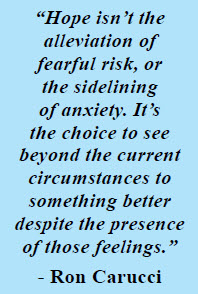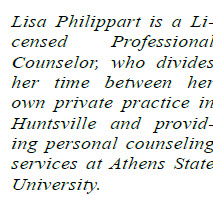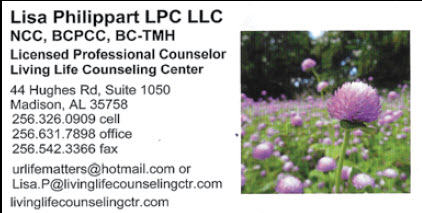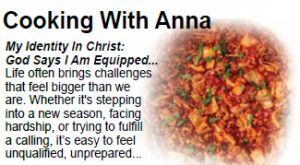 By: Lisa Philippart
By: Lisa Philippart
“Hope isn’t the alleviation of fearful risk, or the sidelining of anxiety. It’s the choice to see beyond the current circumstances to something better despite the presence of those feelings.” Ron Carucci
As we look toward 2022 and leave the challenges of 2021 behind, my “hope” for you is that you will move forward in your life journey, striving to become a new and improved you. According to Christopher Reeve, “Once you choose hope, anything is possible.” Hope is an “individual’s goal-oriented expectations that include both the desire to achieve goals and finding ways to achieve them.” Hope can help motivate behavior in the face of obstacles, as well as provide the psychological and spiritual resources to help you respond to anything life throws at you, with resilience. What if you are not a hopeful person by nature? That’s okay because we all can strengthen our “hope muscle,” and therefore increase our positivity and resilience, even in the midst of difficult circumstances. There is actually a Hope Theory formulated by positive psychologist, Charles Snyder. Snyder believes that hope gives people the will, determination, and sense of empowerment that allows them to reach their goals.
 Research over the past decade shows that people who are hopeful are more likely to attain their aspirations. These people perform better in school and at their jobs. They most often choose healthier lifestyle habits and are able to cope with and recover better from illness. These hopeful people experience higher life satisfaction and have a stronger sense of meaning and purpose. A 2020 study by Matthew Gallagher at the University of Houston on the connection between hope and mental health actually looked at college students who suffered from high rates of depression, anxiety, and stress. The study found several recurring themes regarding the role hope plays in mental health. Gallagher discovered that hope is associated with improved coping strategies. Depression and negative life events are less intense for those who are more hopeful. Having hope is a protective factor against suicide and negative self-talk and thinking. And a hopeful person is more likely to engage in healthy behaviors.
Research over the past decade shows that people who are hopeful are more likely to attain their aspirations. These people perform better in school and at their jobs. They most often choose healthier lifestyle habits and are able to cope with and recover better from illness. These hopeful people experience higher life satisfaction and have a stronger sense of meaning and purpose. A 2020 study by Matthew Gallagher at the University of Houston on the connection between hope and mental health actually looked at college students who suffered from high rates of depression, anxiety, and stress. The study found several recurring themes regarding the role hope plays in mental health. Gallagher discovered that hope is associated with improved coping strategies. Depression and negative life events are less intense for those who are more hopeful. Having hope is a protective factor against suicide and negative self-talk and thinking. And a hopeful person is more likely to engage in healthy behaviors.
Resilience is the key to the connection between hope and mental health. Resilience refers to the ability to bounce back more quickly after adverse experiences, and to learn from those experiences. Resilient people don’t ignore or suppress difficult emotions; they process them, learn from them, and take those lessons into the next phase of their lives. Hope and optimism are closely associated with resilience. The most resilient people, those who can recover quickly from experiences of fear and move toward reasoned action, actively practice hope and optimism daily.
 Let’s look at some ways to cultivate hope toward improving mental health:
Let’s look at some ways to cultivate hope toward improving mental health:
- Spend time with hopeful, optimistic people. When you surround yourself with people who are hopeful and positive, you’re more likely to feel that way yourself (emotional contagion.) You can “catch” both positive and negative emotions from others, so choose your friends wisely!
- Limit media exposure. News and social media tend to focus on extremes…the most frightening and sensational aspects of what’s happening, which can make us more vulnerable to vicarious trauma. And, while social media can make you feel more connected, it can also increase feelings of anxiety and distress.
- Focus on your strengths. If you are naturally creative, think about how you can use that strength to overcome difficulties as you move forward in life. If connecting with others is one of your strengths, reach out to friends and loved ones as a way to build hope and positive emotions.
- Reframe negative thoughts. When you feel afraid or hopeless, try zeroing in on what’s scaring you and looking at it in a different way. For example, if you’re thinking, “I’m never going to stop feeling anxious about everything that’s going on,” you could shift it to, “It’s natural to feel anxious right now, and there are things I can do to make it better.”
- Practice gratitude. I truly believe that gratitude is more effective than self-control, patience, and forgiveness in creating hope for the future. Try keeping a gratitude journal…and at the end of every day, think back on three things for which you are grateful.
Hope and mental health are intricately linked. And we can strengthen both by taking small daily actions that will help us thrive even in the midst of uncertainty.
By: Lisa Philippart
Licensed Professional Counselor










 June 20, 2025
June 20, 2025



